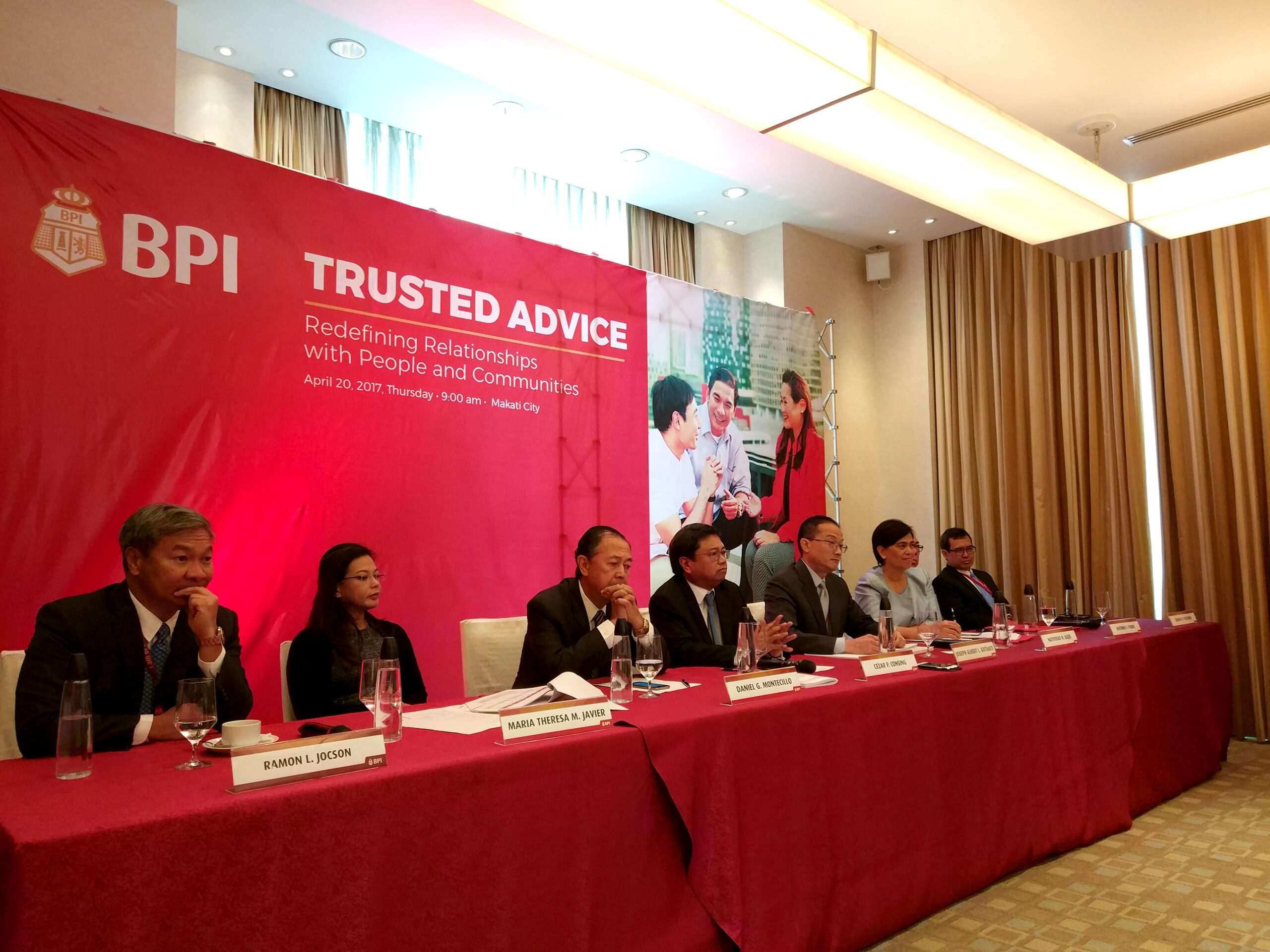SUMMARY
This is AI generated summarization, which may have errors. For context, always refer to the full article.

MANILA, Philippines – The Bank of the Philippine Islands (BPI) got a boost to its bottom line at the beginning of the year, while also stepping up its war against cybercrime.
BPI hit a net income of P6.25 billion for the first quarter of 2017, up 25.6% from the same quarter in 2016. The bank’s total loans were up 19.9% to P1.03 trillion while total deposits climbed 10.7% to P1.44 trillion.
Meanwhile, total revenues reached P17.96 billion, up 17.6%, and net interest income rose to P11.49 billion, higher by 15.0% as asset yields rose along with loan volumes.
Non-interest income also registered strong growth, rising 22.6% to P6.46 billion on higher trading gains, service charges, underwriting fees, and income from asset sales.
The bank ended Q1 2017 with total assets at P1.73 trillion, up 12.4%, or P191.76 billion above Q1 2016 levels, while capital was up 10.2% to P171.85 billion.
As for profitability, cost-to-income ratio improved to 48.6%, versus 51.4% recorded in Q1 2016, while return on assets (ROA) and return on equity (ROE) were 1.5% and 15.0%, up 0.14 and 1.89 percentage points, respectively.
“It’s too early to say whether the [nearly 20%] growth in loans is sustainable throughout the year, but the ROE direction is in the right place. We’ve always told investors that the objective is to get to 15% and it’s moving in the right direction,” said BPI president and CEO Cezar Consing.
BPI’s new chief financial officer Maria Theresa Javier, for her part, pointed to the growth in average balances for loans and growth in BPI’s corporate loan book as the main driver for the rise in net income.
ATM hacker convicted
BPI also made headway in its ongoing efforts to protect its customers from banking fraud.
In recent years, there have been incidents where hackers obtained BPI customers’ ATM card details from terminals and proceeded to illegally withdraw from them. (READ: ATM card skimmers strike at upscale mall in Makati)
BPI executive vice president Ramon Jocson said the bank has made progress against an Eastern European syndicate that has been victimizing the bank through ATM skimming and ATM “jackpotting” or rewiring an ATM to spew out cash.
Five of the syndicate’s members were arrested and one of them has already been convicted. Jocson said the convicted syndicate member, a Romanian, was sentenced to 20 years in jail and ordered to pay almost P1 million in fines.
“The process of hearings and trials is undergoing for the other 4,” he added.
The conviction, Jocson noted, was carried out by a Makati City court in just 3 months as it specifically deals with cybercrime.
“We are the first bank to essentially prosecute [a crime like this] all the way. Most of the perpetrators of these crimes usually jump bail and flee the country but due to close coordination with authorities we were able to stay the course and convict him and we will do so for the other 4. In addition to this, we have also arrested the first phishing suspect,” he said.
The bank also submitted a position paper to the government that details how it can modernize regulations against cybercrime.
“One of the things we asked for is stiffer penalties for incidents like this because currently the files and bails are not commensurate to the crime. The fines for ATM skimming is P15,000 and the problem is after posting bail, they usually disappear,” he explained.
In addition, BPI said it is working with law enforcement authorities to sharpen the way investigations and forensics are carried out in such cases.
On the client side, Jocson said BPI has awareness campaigns to let people know how they can protect their personal information.
“BPI does not solicit personal identifiable information via email, texts, and we don’t send links, but yet there are still a number of clients that respond to this,” he explained.
“This is outside of the purvey of the bank. We can fortify all we want but if [criminals] procure personal identifiable information [from customers] then they have the credentials to transact with the bank.” – Rappler.com
Add a comment
How does this make you feel?





There are no comments yet. Add your comment to start the conversation.